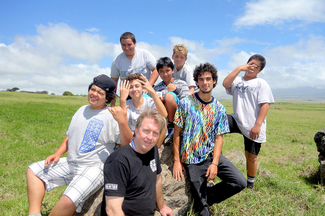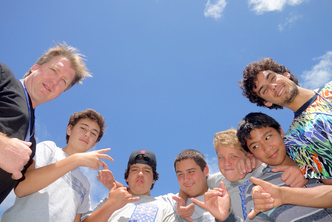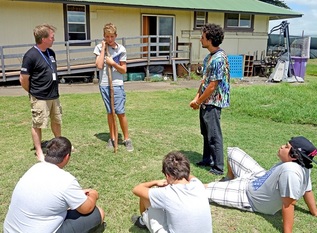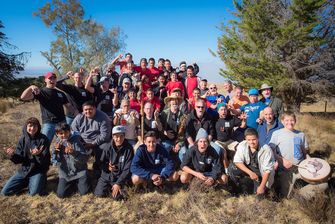 Da Boys with mentors Steve Evans and Ciro Podany. Photo: George Fuller
Da Boys with mentors Steve Evans and Ciro Podany. Photo: George Fuller The Boys to Men Mentoring Network was founded in 1996 by Herb Sigurdson, Joe Sigurdsan and Craig McClain, who assembled a team of like-minded men to design a community involvement program with effective mentoring practices. While expanding to an international network, in 2009 BTM began a site based program in the public schools, which is the model for the Waimea Middle School (WMS) program.
Originating with the Waimea Middle School (WMS) program, BTM has grown to eight programs on Hawai'i Island, with plans to open a program at Honokaa High School next year and expand to Maui.
The BTM group is voluntary and comprised of students taking part in the WMS’ ‘Connecting for Success’ program. “We tell them about Boys to Men, what it's all about and we ask them if they'd like to be a part of it,” says Lori Ching, WMS liaison.
Ching is the conduit between the boys’ school experiences and the BTM mentors. “A normal starting of the day is we come in and meet Lori first and she can tell us what's going on with the boys. If they're having a good week or a bad week, so we know ahead of time,” says Evans.
 Photo: George Fuller
Photo: George Fuller The BTM group is a venue for making connections and self-discovery rather than a place to receive advice. “If something comes up we talk about how it showed up in our lives when we were their age and what we did and how that turned out for us,” says Evans. “The group mentoring has the advantage that the boys are interacting with each other and finding out, as I do when I sit with a group of men that, ‘Oh, he's going through the same thing I am.’ I don't feel as alone and the boys may not feel quite as alone because somebody else is experiencing the same thing,” says Evans.
 Circling up to share. Photo: George Fuller
Circling up to share. Photo: George Fuller The mentors challenged the boys, for the next two weeks to change their behavior and put the seventh graders in charge of keeping them accountable. “At the end of two weeks they couldn't believe how she changed. ‘She’s so much nicer to us. She's not sending us to the office,’ and they realized that by changing themselves, they had changed her,” says Wilburn.
Mentors help students see how their behavior, such as bullying, ripples out to affect others. Returning for the second year of BTM, one student announced that he had stop bullying. “We have an open circle and we asked the kids how bullying had affected them. He realized how pushing, shoving and degrading the other kids was affecting them,” says Wilburn.
The mentors also help the boys to explore unexpected effects of their behavior. “They bullied a kid and he got up to here (fed up) and it came out sideways. A football came across and hit him, not on purpose, and he went over and punched the kid. He'd had enough. So we explained to the kids, look you may be bullying and you think it comes back at you and it doesn't, sometimes it goes after an innocent person,” says Wilburn.
 Adventure weekend.
Adventure weekend. “Both the men's group and BTM is about getting in touch with ourselves and stepping into being leaders in our own lives. So that's what we want. To empower boys to take charge of their own lives,” says Evans. The success of the program was evident at this year’s Connect for Success award ceremony. “It's really heart-warming to see all the awards that the kids get. To see each and every boy in our group get an award,” he adds.
Thanks to the willingness of many volunteer mentors, the Boys to Men program is helping to build a stronger island canoe one boy at time.
 RSS Feed
RSS Feed
